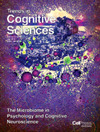投稿信息
稿件收录要求
Published by Elsevier Science. ISSN: 1364-6613.
Mapping an evolving science. Bringing together research in psychology, artificial intelligence, linguistics, philosophy, computer science, anthropology, physiology and neuroscience, Trends in Cognitive Sciences provides a platform for the interaction of these disciplines and the evolution of cognitive research as an independent field of study. Essential reading for those working directly in the cognitive sciences or in related specialist areas, Trends in Cognitive Sciences provides an instant overview of current thinking for both experts and newcomers to the field. Keep up with the latest developments and pinpoint directions for future research. Authoritative review articles commissioned from renowned authors and subject to extensive peer review present the recent advances and latest research. The provision of a list of outstanding questions compiled by the author of each review article helps to flag the direction of future research and is a unique feature of Trends in Cognitive Sciences. Clear graphics and attractive presentation, characteristic of the Trends style, makes even the most complex ideas and research results easily accessible. Update & Comment - discussion of ground-breaking primary research papers, with comments from the authors Monitor - short summaries of recently published work Opinion - a personal perspective on current controversies and developments Together with meeting reports, reviews of books and other media, readers' letters and a conference calendar.Just some of the articles not to miss in '98: Crossmodal links in spatial attention, J. Driver; Unconscious memory and amnesia, J.D. Gabrieli; Computational aspects of the mental lexicon, J. Pustejovsky; Developmental cognitive disorders, A. Karmiloff-Smith; Strategy and frontal lobes, T. Shallice; The representation of second languages, J. Mehler; Mental models and illusory inferences, P. Johnson-Laird; Mate choice turns cognitive, G.F. Miller; Object cognitive: a computional perspective, J. Hummel; Ambiguity in sentence processing, G. Altmann. Indispensable for all the following topics: Abnormal psychology Addiction Artificial intelligence Attention Behaviour and performance Cognitive development Computational theory Consciousness Degenerative disease Emotion Evolution of cognitive processes Language Learning Memory Neural networks Perception Philosophy Problem solving Reasoning Robotics Sleep phenomena Stress




